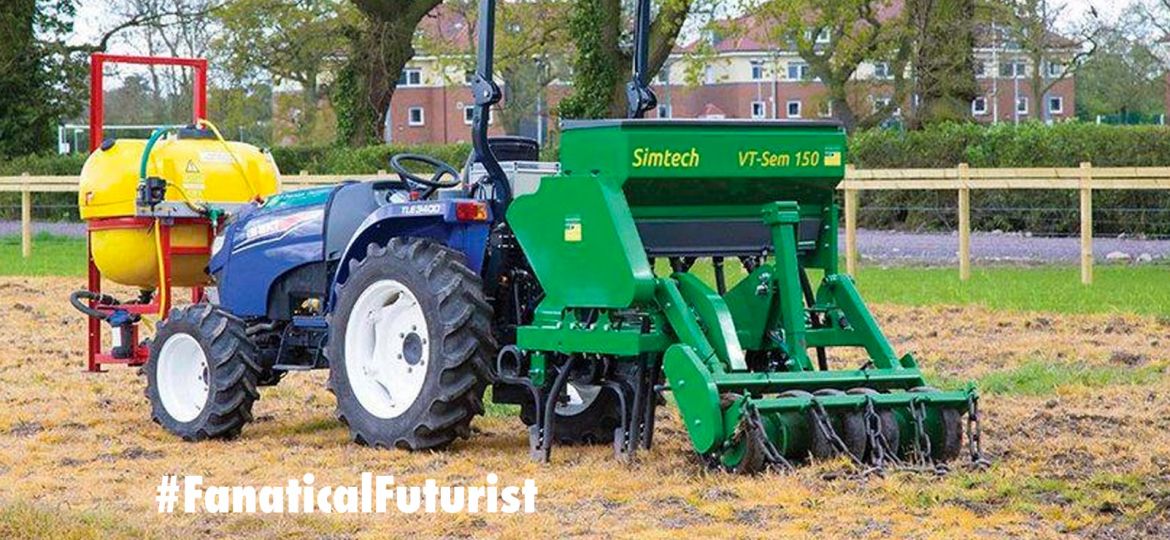
WHY THIS MATTERS IN BRIEF
It was only a matter of time before robots autonomously grew and harvested their own crops, and now it’s happened.
The Agricultural industry is going through a revolution, whether it’s thanks to organisations like DARPA who are formulating new genetic solutions that can re-vitalise and re-animate dead and dying crops, and others who are leading the charge to create the next generation of animal free “Cleanmeat,” bacterial fertilisers, super cows and super crops, or thanks to the new generation of robotic platforms that, fuelled by advanced Artificial Intelligence (AI), Machine Vision and robotics can now automate more farming tasks, such as planting, monitoring, tending and harvesting, than ever before. Add into that fully autonomous vertical farms, Salmon that are zapped by autonomous underwater laser armed drones and farmers that are now more likely to herd robots than sheep, and, frankly, it’s difficult to find any part of our food supply chain that isn’t being touched by technology, or zapped, by technology – even pigs have their own blockchains now.
Now though, in what’s thought to be a world first a team of researchers from Shropshire in the UK have managed to sow and harvest a field of barley using nothing but robots. No humans, just a group of robots and their mechanical mates, and as many of you will have been expecting, it was only a matter of time before it happened.
Ask any modern farmer and you’ll realise that most farming tasks have already been automated, or semi-automated – whether it’s the milking machines that allow cows to “self-milk” themselves, robotic seeding, tending and weeding machines, fully autonomous tractors, and robotic fruit pickers and harvesters. That said though, up until now noone has fully automated the entire process – planting, tending, monitoring and harvesting – without anyone having to step inside a field.
The project, which, for obvious reasons is called the ‘Hands-Free Hectare‘ Project, was set up last October by a team from Harper Adams University with just £200,000 in government funding. They modified a tractor and combine harvester with cameras, lasers and GPS systems, and developed drones and robot “scouts,” that could scoop up and carry soil samples, and monitor the crops from afar.
Kit Franklin, the project’s leader and an agricultural engineer, freely admits that it was “the most expensive hectare of barley ever.” So why bother?
Well, commercial farms and agriculture businesses tend to use large, heavy machinery, and in the majority of cases , while these vehicles are efficient, they can have a damaging effect on the soil and the growth prospects of subsequent crops.
“Automation is the future of farming, but we’re at a stage where farm machinery has got to unsustainable sizes,” said Franklin, who believes smaller, smarter vehicles are the future because they can work with greater precision and reduce harmful soil compaction.
The Hands-Free Hectare project, while successful, was not without its challenges though. The tractor failed to keep a straight line in the field, which meant some of the crops were sown in crooked strips, and after drilling and rolling the crop, the team also struggled to quickly repurpose their tractor for spraying.
“Sadly, we missed that target but we have since managed to get on our T1 and T2 fungicides, including a herbicide to help tackle some grass weeds we were seeing and micro-nutrients to aid the crop growth,” explained Kieran Walsh, the team’s agronomist, adding “monitoring a field from a video feed is harder than being out there and looking yourself.”
It seems inevitable that automation’s role in farming will continue to grow , but despite this many still think that farmers will still have a role to play, after all, someone needs to make sure the robots are working correctly… and, as Walsh hints, there’s also a certain something, an ability to “read” the land that’s unique to farmers. Until a machine can replicate these observational skills, there will be a need for humans to pull on their boots and get down in the dirt every so often.
















